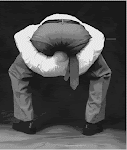I'm not sure exactly where it was along the evolutionary trip that humans developed a powerful attraction to lists, but if I had to guess I'd place it somewhere during our reptilian phase, since it is the reptilian brain where the truly reflexive and involuntary aspects of human behavior are born.
I mean, everybody loves lists.
The only thing better than a list of things, it seems, is a list of things that's divisible by five (for instance: five things). In the List Making Guidebook, it strongly advocates doing this, even if, say, you're trying to rank the Seven Dwarves (seven is not divisible by five. I think).
Another tenant of the List Making Guidebook? The only downside to making lists -- which is that no one (and we do mean fucking no one) will entirely agree with your picks. And they will (and we do mean fucking will) let you know about it.
So it is with this in mind that I devised this clever little five (!) part series, to be published (if you can really call it that), over the next 10 days.
And what's to be listed, you ask patiently?
Ah, yes. A favorite/speciality of mine: Movies about movies (or meta-movies, if you want to get all douchey about it). This is a fairly unusual genre but one (as a lover of movies) I really, uh... love. I make a point to watch these kinds of movies whenever I can and have watched enough of them I feel qualified enough (or maybe just douchey enough) to attempt a list.
To trim the list into a workable five I had to be sort of stringent about what constituted a movie about the movies (which is why, say, Who Framed Roger Rabbit didn't make the cut, since it uses the movie business principally as a setting rather than a subject). I also had to leave out a couple of pretty good movies that fit my guidelines -- the subject of an "Honorable Mention" post I'll do at the end.
Anyhow, my methodology should be fairly self evident as I go along. And if it isn't, we recommend you direct your complaints to the proper place.
Movie about Movies #5:
Boogie Nights
If you only knew how many captions I've written for this picture.
The story of a fucked up kid blessed with "one special thing" (his wang), Boogie Nights tracks the rise and fall (get it?) of his entry (get it?) into the "golden age of porn" of the 70s.
Starring Mark Wahlberg as Eddie Adams (who eventually changes his name to Dirk Diggler), Boogie Nights is, essentially, a classic tragic story, featuring a rise to fame, the corruption of fame leading to a fall on hard (get it?) times, and a redemptive ending where lessons are learned and relationships mended.
That story -- of a meteoric rise and fall -- is common to movies about movies for reasons that are actually sort of obvious: it's the story of Hollywood.
A few years ago, after all, Diablo Cody won an Oscar for writing Juno. This year, her movie Jennifer's Body took a huge dump at the box office, placing sixth (out of four).
For me, the chief attribute of Boogie Nights is in it's details: the direction, characters, acting, sets and tone are all brilliant. And then there's this sequence -- as hilarious, terrifying and awesome a scene as I've seen in a movie.
The main difference between Boogie Nights' story arc and the normal rise and fall Hollywood story is that Boogie Nights actually ends sort of happily. After nearly getting killed in the above scene, Wahlberg returns to his porn "family," begs for forgiveness and is accepted.
As we'll see by some of the upcoming movies on this list, that's actually somewhat unusual. Movies about movies usually end on a downer for their protagonists. And that's, you know, probably appropriate, since if William Faulkner wasn't exactly right in saying that the problem with American lives is they have no second acts, he's almost entirely right if you confine it strictly to Hollywood.
After all, John Holmes (upon whom the Wahlberg character was based) fell into drug addiction and died of AIDS. He didn't make a comeback. Neither did John Belushi or Chris Farley. We'll see about Diablo Cody (though as a former stripper she'll probably land on her feet. Or her tits).
The redemption of a guy like Robert Downey, Jr. (or, to a less talented extent, Charlie Sheen) is notable in part because it's so unusual. It's so hard to get there getting there in the first place getting back must seem even harder than, uh... even harder than avoiding making dick jokes has been in this post.
But it works in Boogie Night because the characters are drawn so well and so precisely that by the end they're just kind of a fucked up family, loving and protective of each other. When Wahlberg's character "returns," it isn't to glory, but to his adopted family. It's where he belongs. And in it's own twisted way, it seems right.







No comments:
Post a Comment